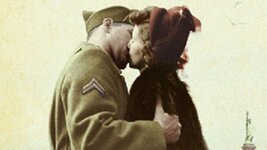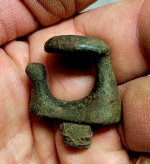DeepseekerADS
Gold Member
- Mar 3, 2013
- 14,880
- 21,725
- Detector(s) used
- CTX, Excal II, EQ800, Fisher 1260X, Tesoro Royal Sabre, Tejon, Garrett ADSIII, Carrot, Stealth 920iX, Keene A52
- Primary Interest:
- Other
What 'War Brides' of the Greatest Generation knew about marriage
What 'War Brides' of the Greatest Generation knew about marriage | Fox News
By Nuala Calvi
Published September 15, 2014
FoxNews.com

It’s a sad fact that today, almost half of all marriages in the United States end in divorce. Sometimes, of course, there are compelling reasons for people to separate. But how many couples who have promised to love and honor “till death us do part” really engage with the true meaning of commitment?
There's one group of people who can teach us a thing or two about commitment – the war brides of the Greatest Generation. Some 70,000 British women – and tens of thousands of brides of other nationalities – came to the U.S. after World War Two, in what became the biggest migration of women in America’s history. They came not, as many resentful tabloid newspapers back home said, because they saw an American husband as a ticket to life in a richer country.
They came because they had made a promise to a man they loved, and they knew it was one they had to keep.
We talk about sacrificing things for love, but these women really sacrificed – not just their nationality but everything and everyone they knew.
By the time the U.S. government had got its troops home and could turn its attentions to shipping back their brides, it had sometimes been a year or more since those women had seen the men they had married – and often they had only snatched a few brief days together as husband and wife before D-Day. Yet when the call came, they knew they had to answer it.
We talk about sacrificing things for love, but these women really sacrificed – not just their nationality but everything and everyone they knew.
In those days a ticket home on an ocean liner – much less a plane ticket – was out of reach for most ordinary people, and with few in England owning a phone, the brides knew it would be years before they heard or saw from their families again – if ever.
Those brides knew they were literally choosing between their families and their husbands when they made that decision, and some mothers had breakdowns when their daughters left, convinced they had lost them for good.
Moreover, this was an era when most British people had only encountered America and Americans on the silver screen, so the brides had no idea what to expect when they arrived on U.S. soil. It truly was a leap of faith.
Most had no concept of how vast a country America was, and that marrying someone from a rural area might mean being somewhere without another town for many miles, something unthinkable in a tiny country like Britain. Those who came to the southwestern states sometimes felt as if they had landed in an alien landscape.
But alien is what the war brides themselves now were. Rae Zurovcik found herself an exotic object of fascination in rural Pennsylvania – when she went to the local diner for the first time, all the regulars had already heard about the arrival of The War Bride, and were keen to talk to this strange new creature and hear her funny accent.
Meanwhile the American lifestyle often wasn’t what it had seemed on the silver screen. Some women came to communities which still did not have electricity, and with thousands of men returning from Europe, jobs were scarce and many former GIs had to survive on state handouts for the first year.
Lyn Patrino and her husband Ben found themselves living in a shack in the woods, surviving largely on corn and potatoes. Yet ask her now, 70 years on, and she’ll tell you it was the best time in their marriage. They were young, they were alone together for the first time, and that, to them, was paradise.
The hardship they faced only cemented their marriage because they were forced to pull together as a team. There was no running back to mother, because mother was 6,000 miles away, so you just got on with it. And when you’d come from a Blitz-ravaged country, where you’d lived on meagre rations anyway, you were used to making do.
With their families the other side of an ocean, and loneliness and homesickness beginning to bite, one lesson the war brides learned was the importance of making an effort with your partner’s relations.
Sometimes American moms could be frosty with the foreign girl their son brought home – one war bride told me her mother in law would frequently show her a picture of the local girl her husband was “meant” to marry. Lyn fell out so badly with her mother in law that at one point the older woman told Lyn’s husband Ben: “It’s her or me”. But when Lyn got ill, it was her mother in law who was there for her. She learned to appreciate that “you don’t marry a man, you marry a whole family, and you’ve got to bend over backwards to make it work.”
Like the vast majority of wartime marriages, Lyn and Ben’s endured. In fact, the rate of divorce among war brides was lower than that among the general population, despite all the challenges. When you had moved continents for another person, you made darn sure it worked.
Like most WWII war brides, Lyn is now a widow – but on Ben’s gravestone, her own name is carved alongside his, along with the title of ‘their’ song, which seems to embody her generation’s attitude to commitment. It reads: Till the End of Time.
What 'War Brides' of the Greatest Generation knew about marriage | Fox News
By Nuala Calvi
Published September 15, 2014
FoxNews.com

It’s a sad fact that today, almost half of all marriages in the United States end in divorce. Sometimes, of course, there are compelling reasons for people to separate. But how many couples who have promised to love and honor “till death us do part” really engage with the true meaning of commitment?
There's one group of people who can teach us a thing or two about commitment – the war brides of the Greatest Generation. Some 70,000 British women – and tens of thousands of brides of other nationalities – came to the U.S. after World War Two, in what became the biggest migration of women in America’s history. They came not, as many resentful tabloid newspapers back home said, because they saw an American husband as a ticket to life in a richer country.
They came because they had made a promise to a man they loved, and they knew it was one they had to keep.
We talk about sacrificing things for love, but these women really sacrificed – not just their nationality but everything and everyone they knew.
By the time the U.S. government had got its troops home and could turn its attentions to shipping back their brides, it had sometimes been a year or more since those women had seen the men they had married – and often they had only snatched a few brief days together as husband and wife before D-Day. Yet when the call came, they knew they had to answer it.
We talk about sacrificing things for love, but these women really sacrificed – not just their nationality but everything and everyone they knew.
In those days a ticket home on an ocean liner – much less a plane ticket – was out of reach for most ordinary people, and with few in England owning a phone, the brides knew it would be years before they heard or saw from their families again – if ever.
Those brides knew they were literally choosing between their families and their husbands when they made that decision, and some mothers had breakdowns when their daughters left, convinced they had lost them for good.
Moreover, this was an era when most British people had only encountered America and Americans on the silver screen, so the brides had no idea what to expect when they arrived on U.S. soil. It truly was a leap of faith.
Most had no concept of how vast a country America was, and that marrying someone from a rural area might mean being somewhere without another town for many miles, something unthinkable in a tiny country like Britain. Those who came to the southwestern states sometimes felt as if they had landed in an alien landscape.
But alien is what the war brides themselves now were. Rae Zurovcik found herself an exotic object of fascination in rural Pennsylvania – when she went to the local diner for the first time, all the regulars had already heard about the arrival of The War Bride, and were keen to talk to this strange new creature and hear her funny accent.
Meanwhile the American lifestyle often wasn’t what it had seemed on the silver screen. Some women came to communities which still did not have electricity, and with thousands of men returning from Europe, jobs were scarce and many former GIs had to survive on state handouts for the first year.
Lyn Patrino and her husband Ben found themselves living in a shack in the woods, surviving largely on corn and potatoes. Yet ask her now, 70 years on, and she’ll tell you it was the best time in their marriage. They were young, they were alone together for the first time, and that, to them, was paradise.
The hardship they faced only cemented their marriage because they were forced to pull together as a team. There was no running back to mother, because mother was 6,000 miles away, so you just got on with it. And when you’d come from a Blitz-ravaged country, where you’d lived on meagre rations anyway, you were used to making do.
With their families the other side of an ocean, and loneliness and homesickness beginning to bite, one lesson the war brides learned was the importance of making an effort with your partner’s relations.
Sometimes American moms could be frosty with the foreign girl their son brought home – one war bride told me her mother in law would frequently show her a picture of the local girl her husband was “meant” to marry. Lyn fell out so badly with her mother in law that at one point the older woman told Lyn’s husband Ben: “It’s her or me”. But when Lyn got ill, it was her mother in law who was there for her. She learned to appreciate that “you don’t marry a man, you marry a whole family, and you’ve got to bend over backwards to make it work.”
Like the vast majority of wartime marriages, Lyn and Ben’s endured. In fact, the rate of divorce among war brides was lower than that among the general population, despite all the challenges. When you had moved continents for another person, you made darn sure it worked.
Like most WWII war brides, Lyn is now a widow – but on Ben’s gravestone, her own name is carved alongside his, along with the title of ‘their’ song, which seems to embody her generation’s attitude to commitment. It reads: Till the End of Time.




